777 OSAT projects 2016
Appearance
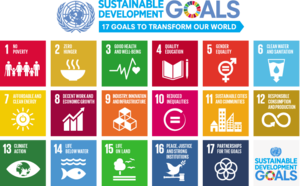
Assignment
- Identify an OSAT that you would like to design to be a 3D printable technology
- Make sure someone else has not already done it : existing designs here. Also check former years 2014 and 2015(You can choose to do a major improvement on past design)
- Reserve your OSAT by signature tagging with ~~~~ next to the OSAT on the list generated by the Appropedia community: Requests for 3-D printable open source appropriate technology. You can add your own ideas to the list, more than one of you can tackle the same tech in a different way, you may improve upon existing designs if you do so in a significant way. Double check someone else has not already done a better job - use http://yeggi.com Do this by 11/15
- Design 3D printable components with ONLY OS CAD packages (e.g. OpenSCAD, FreeCAD, or Blender) for FreeCAD put on https://www.youmagine.com/ and link back to it on Appropedia.
- Create an Appropedia page for your project. (Easiest way to create a page is put double square brackets around your project title on the reservation list - this will create a red hyperlink to it)
- Include the following sections on your page using the template below (copy and paste wiki markup into your page)
- Add picture and link to your project page in gallery below.
- Print component and bring to class - Complete and due by 12/6
Grading[edit | edit source]
- 20% Print quality
- 30% Documentation
- 25% Design (design for printing, plastic minimization)
- 25% Function - Is it OSAT? Does it work?
Automatic reductions: -50% no source or the use of non-OS software -10% per day for late
Gallery[edit | edit source]
Add your image and link the gallery below in a single line after the last one in the list
- 777 OSAT 3-D Printable Designs
-
Parametric Quick Release Buckles
-
Garden Pruner/General Use Shears
-
OSAT Budget Gas Mask
-
]]
-
Bow and Hand Drill[1]
Template[edit | edit source]
Copy the wiki markup below to your page to use as a template
Title of the device or system[edit | edit source]
Project developed by [your name linked to your user account]
Abstract[edit | edit source]
- Paragraph description of the OSAT - why is it Appropriate? What need does it fulfil? Are there case studies you have found of a technology being used successfully?
- Picture of completed print using your printer
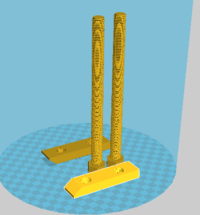
Bill of Materials[edit | edit source]
- Provide a full BOM -- Materials needed for fabrication of device and alternative materials if they are not available, prices/sources of non-printable parts
- Upload and link to all source files from open source CAD
- Upload and link to all STLs
Tools needed[edit | edit source]
- MOST Delta RepRap or similar RepRap 3-D printer
Skills and knowledge needed[edit | edit source]
- If you used special skill – link to relevant wikipedia or wikiversity articles/courses
Technical Specifications and Assembly Instructions[edit | edit source]
- Provide directions for print/assembly - be detailed enough in your "how to" to ensure that someone could construct the device from your description. Consider the elegance of IKEA like instructions.
- Include print time estimate
- Include assembly time estimate
- Including drawings or pictures of the device at stage of assembly at minimum. (Upload)
- Consider video if appropriate
Common Problems and Solutions[edit | edit source]
- Include common mistakes/problems to avoid in building your OSAT and how to overcome them
Cost savings[edit | edit source]
- If your solution is not a low cost one then it is not really appropriate.
- Estimate your costs
- Find a commercial equivalent
- Calculate $ savings and % savings
References[edit | edit source]
- The sources of information (e.g. engineering handbooks, journal articles, government documents, webpages, books, magazine articles etc.). References should use the and <references /> tags and can be in any format but should include all the information necessary for someone else to find the same information you did. For example:[1]
- ↑ web page: Department of Energy (DOE) Landscaping and Energy Efficiency, DOE/GO-10095 (1995) Available: http://web.archive.org/web/20021201231338/http://www.eren.doe.gov:80/erec/factsheets/landscape.html
Based on the developmental needs addressed (e.g. food, heat, electricity, clean water, health care, etc.) be sure to label your device in the proper categories e.g. use . Be sure to categorize your device so that it will be easy to find – for example "Low voltage connection basics" is categorized in .

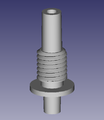


















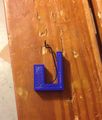








![]]](/w/images/thumb/b/b3/Can_Opener.jpeg/120px-Can_Opener.jpeg)

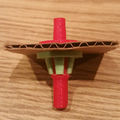
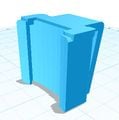



![Bow and Hand Drill[1]](/w/images/thumb/1/18/IMG_0409.JPEG/120px-IMG_0409.JPEG)




